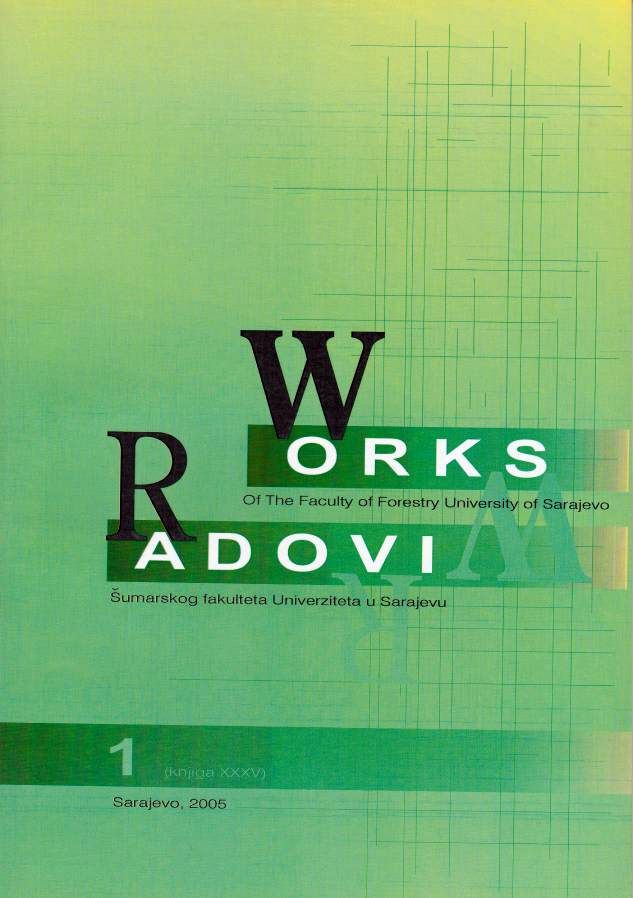INNOVATION IN FOREST POLICY AND ECONOMICS TEACHING AND RESEARCH
DOI:
https://doi.org/10.54652/rsf.2005.v35.i1.193Keywords:
Land use practices, natural resources protection, wood production, environmental services, forest ecosystem managementAbstract
UDK 630*8/.9
The Bologna process thrusts forestry and forestry education into the context of an evolving global economy as well as worldwide concerns about environmental protection and climate change. It stimulates the integration of forestry into the framework of sustainable land-use practices and the combination of forest management experience with new scientific knowledge and research methodology. Forest professionals need a comprehensive educational background if they are to tackle rapidly changing social, economic and political problems. At the same time they need to understand the evolving and locally specific social and cultural aspects of forestry. This demands a joint approach to forest management, environment protection and landscape conservation. Maintaining the natural resource base and managing forests in a sustainable manner will require teaching programme combining policy and law, business economics and management, and forest resource and environmental economics components.
Downloads
References
BINDER, C. R., 2007a: From Material Flow Analysis to Material Flow Management – Part I: Social Sciences Modeling Approaches Coupled to MFA. Journal of Cleaner Production 15 (2007) 1596-1604.
BINDER, C. R., 2007b: From Material Flow Analysis to Material Flow Management – Part II: The Role of Structural Agent Analysis. Journal of Cleaner Production (2007) 15 1605-1617
CIRELLI, M.-T.; SCHMITHÜSEN FR., 2000: Trends in Forestry Legislation: Western Europe. FAO Legislative Study 10, Rome. http://faolex.fao.org/faolex/index.htm
ETZKOWITZ, H., 2001: The Second Academic Revolution and the Rise of Entrepreneurial Science. IEEE Technology and Society Magazine, Summer 2001.
European Commission, 2000: Competitiveness of the European Union Woodworking Industries – Summary Report. Office for Official Publications of the European Communities, Luxembourg. 72 pp.
GIBBONS, M.; LIMOGES, C.; NOVOTNY, H.; SCHWARTZMANN, S.; SCOTT, P.; TROW, M., 1994: The New Production of Knowledge. London, Sage.
NOVOTNY, H.; SCOTT, P.; GIBBONS, M., 2001: Re-Thinking Science – Knowledge and the Public in an Age of Uncertainty. London, Polity Press with Blackwell Publishers.
PETERS, S.; FORTGEFÜHRT VON BRUEHL, R. M. AND J. N. STELLING, 1999: Betriebswirtschaftslehre – Einführung. 9. durchges. Auflage. Oldenbourg, München. 239 S.
SCHMITHÜSEN, F.; BISANG, K.; ZIMMERMANN, W., 2001: Cross-Sector Linkages in Forestry – Review of Available Information and Considerations on Further Research. Working Document No 1; Forestry Department; FAO, Rome. 56 pp.
SCHMITHÜSEN, F., 2003a: Understanding Cross-Sectoral Policy Impacts – Policy and Legal Aspects. In: Cross-sectoral Policy Impacts between Forestry and other Sectors. FAO Forestry Paper 142: 5-44 (2003); FAO, Rome.
SCHMITHÜSEN, F., 2003b: The Global Revolution in Sustainable Forest Policy – A European Perspective. Pinchot Lecture Series; Pinchot Institute for Conservation, Washington D.C.
SCHMITHÜSEN, F.; KAISER, B.; SCHMIDHAUSER, A.; MELLINGHOFF, ST.; KAMMERHOFER, A. W.; 2003c: Unternehmerisches Handeln in der Wald- und Holzwirtschaft – Betriebswirtschaftliche Grundlagen und Managementprozesse. Deutscher Betriebswirte-Verlag, Gernsbach. 560 S.
SCHMITHÜSEN, F., 2004: European Forest Policy Developments in Changing Societies: Political Trends and Challenges to Research. In: Towards the Sustainable Use of Europe’s Forests – Forest Ecosystem and Landscape Research: Scientific Challenges and Opportunities. EFI Proceedings No. 49: 87-99, European Forest Institute, Joensuu, Finland.
SCHMITHÜSEN, F.; SEELAND, K., 2006: European Landscapes and Forest as Representation of Culture. In: Cultural Heritage and Sustainable Forest Management – The Role of Traditional Knowledge; Volume 1: 217-224 (2006), Ministerial Conference on the Protection of Forests in Europe, Liaison Unit, Warsaw, Poland.
SCHMITHÜSEN, F.; KAISER, B.; SCHMIDHAUSER, A.; MELLINGHOFF, ST.; KAMMERHOFER, A. W.; 2006: [Entrepreneurship in the Forest- and Wood Products Industry – Principles of Business Economics and Management]. Publishing Centre of the Faculty for Economic Sciences, University of Belgrade, Serbia. 529 pp. (Serbian Translation of the Text- and Reference Book in German published in 2003, Deutscher Betriebswirte-Verlag, Gernsbach.)
SCHOLZ, R. W.; TIETJE, O., 2002: Embedded Case Study Methods Integrating Quantitative and Qualitative Knowledge. Thousand Oaks, London, New Delhi; Sage Publications.
SHINN, T., 2002: The Triple Helix and New Production of Knowledge – Prepackaged Thinking on Science and Technology. Social Studies of Science 32/4 (August 2002) 599-614.






















